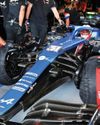
With stable regulations for 2020, this year’s F1 grid is very much an evolution of the last. This has allowed teams to focus on refining their aerodynamic concepts, packaging and cooling strategies. Yet although the cars may look similar, under the skin there have been endless technical tweaks; all trying to make a faster, lighter and more effiient racecar.
With 2021 on the horizon, the teams are also facing the challenge of when resources should be switched to developing their 2021 contender to kick start the next era of F1. Furthermore, teams will also be using this year’s car as a testing platform for developing the systems which will remain unchanged for 2021, such as the power unit and its associated systems. So, while on the surface it all might all look very similar, as always in F1 there are plenty of technical developments.
Mercedes W11
This story is from the April 2020 edition of Racecar Engineering.
Start your 7-day Magzter GOLD free trial to access thousands of curated premium stories, and 9,000+ magazines and newspapers.
Already a subscriber ? Sign In
This story is from the April 2020 edition of Racecar Engineering.
Start your 7-day Magzter GOLD free trial to access thousands of curated premium stories, and 9,000+ magazines and newspapers.
Already a subscriber? Sign In
Talk the torque
More thoughts on in-wheel motors and their effects on twisting force
Rolling about
An explanation of the limitations of a previous load transfer article, bringing jacking forces into the mix
F1 breaks schedule records
The FIA has confirmed no fewer than 23 races on the 2022 Formula 1 World Championship schedule, the highest number of grands prix ever to be held in a single season, and that has led to criticism from some teams that will be on the road for eight months.

Under pressure
Toyota may have finished first and second at Le Mans this year, but the effort required to overcome a fuel delivery problem and finish with both cars was Herculean
Physics at work
Dutch company, Intrax, offers Racecar Engineering an insight into the technologies it employs to optimise its suspension products
Williams' 2030 ambition
Williams Racing has committed to becoming climate positive by 2030 as part of an all-new sustainability strategy.
Diff'rent strokes
Racecar looks at the different types of mechanical differential, their benefits and limitations
Das Boot
A curious Twitter exchange fired up a unique, hydrogen-powered, cross-country project that will contest the Baja 1000 in November 2022

Air born
Every racecar engineer's dream is a blank sheet of paper design. When Hoonigan and Subaru approached Vermont Sportscars about building the next generation of Gymkhana racer, that's just what the company was given

Remote control
Called variously ‘virtual garages’, ‘mission control’ or ‘race support rooms’ is the future of race engineering sitting in the warm back at HQ?